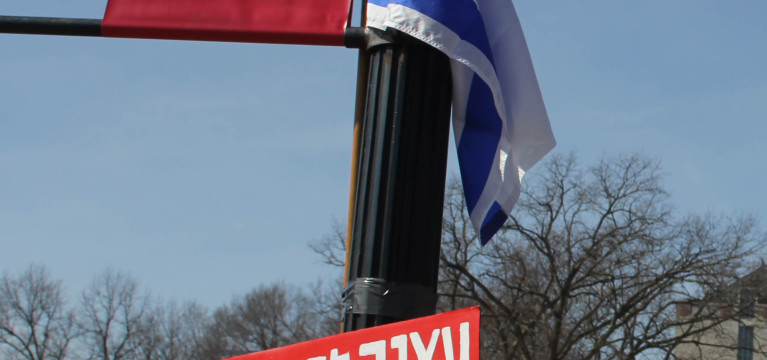The Oval was the setting for a discussion on Palestinian rights Thursday.
The Committee for Justice in Palestine at Ohio State celebrated the 10th annual Israeli Apartheid week by setting up a mock Apartheid wall on the Oval.
The CJP at OSU has celebrated Apartheid week in the past, but this year the mock wall spanned nearly seven feet and included detailed paintings supporting the movement. About 50 people came and went while the wall was up, offering different opinions and asking questions.
Israeli Apartheid week aims to spread the word about “the nature of Israel as an apartheid system” and to promote Boycott, Divestment and Sanctions campaigns, according to its website.
An apartheid system racially segregates and politically and economically discriminates, like the former social system in South Africa, which separated those who were black or other another racial descent from white people.
There is a part-wall, part-fence, mostly located in the West Bank of Palestine, that the Israeli government made the decision to build in 2002. The government said the wall was necessary to prevent Palestinian suicide bombers from entering the country, but because Palestinian land was confiscated to build it, many Palestinians have been separated from their land and jobs.
Belal Daoud, a fifth-year in information systems and the publicity director of CPJ at OSU, said the mock wall at OSU was meant to be an educational tool.
“The best way to raise awareness is to show what we have to, or what Palestinians have to, deal with on a day-to-day basis,” Daoud said, referring to the separation the real wall creates.
Last week, the CPJ put about 2,000 mock eviction notices on some off-campus housing doors to further simulate the Israeli-Palestinian conflict.
The notices said real eviction notices are “routinely given to Palestinian families living under the illegal Israeli occupation for no reason other than their ethnic background.”
Daoud said he hoped the wall would spark debate and give students the chance to see the differences in viewpoints.
“I would like people to see the different sides,” Daoud said. “We want to have conversation, you know, we want to exchange ideas.”
The Israeli-Palestinian conflict is largely over land and religions and has been fought over for generations. Israel, Gaza and the West Bank were once called Palestine, but after a war in 1948, Palestine was divided and Jewish Israelis claimed some land for religious reasons.
Some students, like Michael Berkovich, a third-year in computer science and engineering who said he supports the Israeli side of the conflict, said there are better ways to create peace.
“It’s about conversation, and many of the organizers of the mock wall are radical,” Berkovich said. “What’s going to solve the problem is by being friends with those on both sides, not by offending.”
Lorette Alamir, a first-year in biology, said she has a close connection with Palestine.
“I just want there to be peace there because I go there (the West Bank) every summer and my grandparents live there,” Alamir said. “(Being pro-Palestinian is) just against injustice whether you are Arab or not.”
Daoud said he wants events for Israeli Apartheid week to happen every year at OSU.
“I’m hoping it’s going to be a tradition,” Daoud said. “I’m hoping that we’ll have the wall every year, we’ll have the mock eviction notices every year. I want people to almost expect it to happen.”












